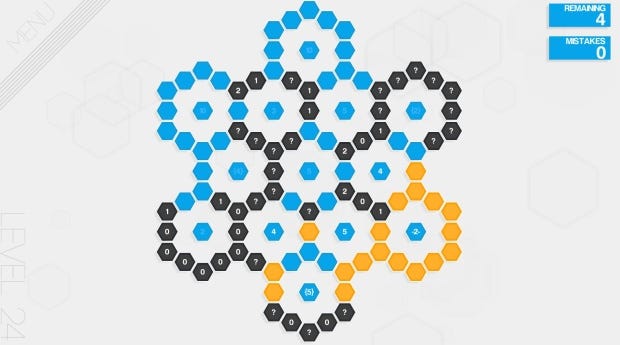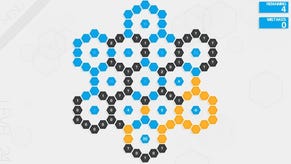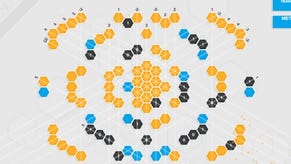Game Swap: Hexcells Infinite
Pip makes Graham play a logic puzzle
Game Swap is a series in which one person recommends another a games they might like. This week, Pip suggests Graham play logic puzzle game Hexcells Infinite [official site].
Pip: When I recommended that Graham play Hexcells I wasn't just doing my normal thing of assuming EVERYONE should play and enjoy Hexcells. NO. This was a reasonable recommendation for reasonable reasons. Graham has been playing a fair bit of the picross puzzler Pictopix recently and Hexcells shares a lot of gaming DNA with picross puzzles. Hexcells is a game about using logic to figure out which hexes on a grid should be blank and which should be filled in. You only have a few pieces of information at your disposal – you might know how many filled-in hexes are in a column, for example, or how many adjoin a particular hex. You then work your way through the possibilities until the grid is complete. You don't get pictures at the end like you do in picross, usually, but you do get that same logic puzzle satisfaction. I adore Hexcells. I hope Graham likes it too.
Graham: When I got Pip's recommendation, my first thought was, "Oh no." Not because I didn't think I'd like the game, but because I was certain that I would. I love Picross (and Slitherlink and Sudoku and many similar games), but I don't always feel good after the hazy lost weekends spent playing them. And Pip specifically recommended the third game in the Hexcells series, which has the word "Infinite" in the title. Either it was going to be an incoherent game about lighthouses or I was going to experience a brief moment of clarity months later, groggy and unshaven and homeless after an extended logic puzzle bender, and then disappear forever.
Anyway, I've played it for a few hours now and it turns out I do like it. THANKS PIP.
Pip: I will admit that I hadn't taken that side of the equation into consideration. My dirty puzzle habit mostly confines itself to mobile titles like Dots and the Nonograms Katana version of picross so I hadn't really thought PC would offer the same risk. Oops!
If it's any consolation, the infinite bit where you generate puzzles is nowhere near as satisfying as the curated puzzle sections.
Can I ask how closely you think it mirrors the picross pleasures given that's why I thought you might like it?
Graham: It mirrors it pretty closely. In a way it feels like a sequel to picross, in that it's using many of the same elements but with a lot of satisfying twists and layers of complexity.
For those not familiar, in picross you've got numbers at the ends of rows and columns which tell you how many squares within that row or column need to be filled in. So a column might have "1 3" at the top, which means there's a single square and a block of three squares which need to go somewhere in that column. By comparison, in Hexcells you're initially told which hexes need to be filled with numbers in a fashion similar to Minesweeper, with numbers on the board itself to indicate adjacencies. This means that the optional right-click "not-filled" of picross is now essential. In fact, uncovering a number on the board which indicates how many adjacent spaces need filled is much more satisfying than filling the hexes in, because filling in often nets you no new information.
It approximates the satisfaction of picross, then. I find it more satisfying because you're uncovering more as you play, but also possibly consequently less relaxing because it's more difficult?
Pip: I think I passed beyond that stage at some point. I just checked my Steam account and I have 33 hours on the game. That's in large part because I now speedrun the game. I've solved the puzzles that form the main game so often that they're soothing to me.
I think I could fill some in from memory at this point, but the challenge for me then becomes filling them in logically, not skipping any difficult steps by just relying on the fact I know which hexes are filled and which are blank. I have to work out why they are there.
I'm not sure if that's a thing many people do – maybe it sounds weird – but there are these pleasant logic pathways that I like to revisit in Hexcells and that, to me, is very soothing. It's not something you get the first time around, though.
Graham: It's probably the case that I've simply forgotten a time when picross wasn't similarly soothing to me. There are a handful of strategies that you learn in that game, which for me were hard-earned through play without ever looking anything up, and which I can now comfortably apply to any board and swiftly clear it. It feels like tidying up. Being new to it, Hexcells is still about learning and discovery.
On this front, it feels like Infinite ramps up pretty fast. I wonder if I should have started with the earlier games, because while I'm still making good progress and enjoying it, the size of boards leapt in size at one point early on - maybe world 2, level 1 - such that I had a sudden feeling of tiredness. Another "oh no" moment, where I could tell the time-to-completion had just quadrupled or more. Like I say, I'm still enjoying it a lot, but I might have preferred to hang out in the shallows for a while longer.
For contrast, I'm playing through Pictopix at the moment and there are entirely too many 10x10 grids. I find them too easy and I'm just desperate to unlock the larger sizes. So yeah. I think there's an interesting balancing act for puzzle game design here.
Pip: The learning curve is why I liked Infinite more than the other two, I think. I certainly didn't feel any urge to go back and replay either Hexcells Plus or the original Hexcells and I suspect that's because I started with Infinite and worked backwards. To me that was just to get a bit more time with new puzzles, but the earlier games didn't have the same bite.
I had a similar thing with picross a while ago. I figured out that I could pretty much solve any picross puzzle given enough time and so the difficulty all-but evaporated. There's the odd puzzle which really offers a challenge, but generally they feel a bit tiring now. More like busywork than a wonderful bit of brain occupation, if the difference makes sense.
I ended up switching to coloured picross because working with a colour palette I liked offered an extra tang of enjoyment. I'm currently picrossed out, though. It's why I still haven't picked up Pictopix despite John raving about it.
What I wouldn't give for a new Hexcells...
Graham: I think what I'm realising is that my relationship to these kinds of games is confused. You describe picross feeling like busywork, I describe it as feeling like tidying up. That sense of it being occupying but not challenging is both part of why I like it as a way to relax, and part of why I dislike it. It's easy to lose hours to it and feel like I've wasted time with a simulacrum of accomplishment.
I'm still in the 'learning' stage with Hexcells, but that helps and hurts it. It helps because learning new things feels more worthwhile, but it also lowers the constant drip-drip of accomplishment because boards take longer. There's sometimes a point with these games where they get hard enough, or take long enough per board, that I start to remember that what I'm learning has no application outside of the game.
Buuuut that's more about me than the game. Hexcells Infinite seems very cleverly designed. I mentioned above about how numbers appear on the board like in Minesweeper to indicate numbers adjacent hexes which need filled, but it then introduces numbers at the ends of rows and columns as well, with indicators for whether filled hexes are in a block or separated, and then it begins hiding some of the numbers, and... Each new wrinkle is brilliant.
Pip: Wrinkles are what I was going to mention, weirdly. I used to get some of the pleasure of picross that you describe – it wasn't brain-bending, but it was just enough stimulation using a small toolset – and I used to get the same grubby, disappointed feeling afterwards. But there was also a bit of grit somewhere in the puzzles. I'd still find a little wrinkle I needed to straighten. Then I went on a mega picross binge and straightened so many wrinkles that they all got too simple and there was no… traction? Something like that.
With Hexcells I found that traction again, which was a delight because a good puzzle game is a rare thing. Certainly one which offers a new experience and does it well is a rare one.
Something I'm wondering now, though, is whether this was a good Game Swap candidate. I picked a thing I thought you would like and you liked it, but it didn't really go against what you normally like to play, it just gave you a new option in a familiar category.
Graham: I think, in my case, it was a good candidate. Setting aside jokes about wild binges, I am always for some reason reluctant to play games I am certain I will like - even though I am obviously often wrong in that certainty. Part of the impetus to launch something new is to find out whether I'll like it. I had installed and uninstalled Hexcells half a dozen times after reading John's articles about it without ever launching the games, but the personal recommendation got me over the initial hump and to actually play it. And, as you say, a good puzzle game with new ideas is extremely rare. I now have that when I didn't before.
That might sound ridiculous, but I really don't think it is. There is so much choice about what to play now that I often experience a kind of paralysis. I often spend an hour just looking at my Steam list trying to decide what to play, till I'm out of time to play anything at all. So basically: all considerate and personal recommendations are good recommendations, and I think that's why Game Swap is valuable over and above reviews, algorithmic suggestions, or our own assumptions about what we'd like.
Pip: Hooray! Although maybe I'll stay away from further logic puzzle recommendations given you want to watch your child grow up.
Hit!
Graham: This recommendation was a success for me. I love logic game puzzles like this, there's very few of them that offer new ideas, and it's apparent that Hexcells Infinite is cleverly designed after just a few hours with it. I am going to spend many hours more with it.









